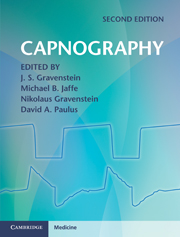Book contents
- Capnography
- Capnography
- Copyright page
- Contents
- Contributors
- Preface
- Commonly used abbreviations
- 1 Clinical perspectives
- 1 Ventilation
- 2 Ventilation Capnography and respiratory assessment outside of the operating room
- 3 Airway management in the out-of-hospital setting
- 4 Airway management in the hospital setting
- 5 Airway management in the operating room
- 6 Capnography during anesthesia
- 7 Monitoring during mechanical ventilation
- 8 Capnography during transport of patients (inter/intrahospital)
- 9 Capnography as a guide to ventilation in the field
- 10 Neonatal monitoring
- 11 Capnography in sleep medicine
- 12 Conscious sedation
- 13 Capnometry monitoring in high- and low-pressure environments
- 14 Biofeedback
- 15 Capnography in non-invasive positive pressure ventilation
- 16 End-tidal carbon dioxide monitoring in postoperative ventilator weaning
- 17 Optimizing the use of mechanical ventilation and minimizing its requirement with capnography
- 18 Volumetric capnography for monitoring lung recruitment and PEEP titration
- 19 Capnography and adjuncts of mechanical ventilation
- 20 Cardiopulmonary resuscitation
- 21 Capnography and pulmonary embolism
- 22 Non-invasive cardiac output via pulmonary blood flow
- 23 PaCO2, PetCO2, and gradient
- 24 The physiologic basis for capnometric monitoring in shock
- 25 Carbon dioxide production, metabolism, and anesthesia
- 26 Tissue- and organ-specific effects of carbon dioxide
- 27 Atmospheric monitoring outside the healthcare environment and within enclosed environments: a historical perspective
- 28 Capnography in veterinary medicine
- 29 Carbon dioxide pathophysiology
- 30 Acid–base balance and diagnosis of disorders
- 31 Ventilation/perfusion abnormalities and capnography
- 32 Capnographic measures
- 33 Improving the analysis of volumetric capnograms
- 34 Capnography and the single-path model applied to cardiac output recovery and airway structure and function
- 35 Carbon dioxide and the control of breathing: a quantitative approach
- 36 Technical specifications and standards
- 37 Carbon dioxide measurement
- 38 Gas flow measurement
- 39 Combining flow and carbon dioxide
- 40 Brief history of time and volumetric capnography
- 41 The first years of clinical capnography
- 42 The early days of volumetric capnography
- Appendix: Patterns of time-based capnograms
- Index
35 - Carbon dioxide and the control of breathing: a quantitative approach
from 1 - Ventilation
Published online by Cambridge University Press: 05 August 2011
- Capnography
- Capnography
- Copyright page
- Contents
- Contributors
- Preface
- Commonly used abbreviations
- 1 Clinical perspectives
- 1 Ventilation
- 2 Ventilation Capnography and respiratory assessment outside of the operating room
- 3 Airway management in the out-of-hospital setting
- 4 Airway management in the hospital setting
- 5 Airway management in the operating room
- 6 Capnography during anesthesia
- 7 Monitoring during mechanical ventilation
- 8 Capnography during transport of patients (inter/intrahospital)
- 9 Capnography as a guide to ventilation in the field
- 10 Neonatal monitoring
- 11 Capnography in sleep medicine
- 12 Conscious sedation
- 13 Capnometry monitoring in high- and low-pressure environments
- 14 Biofeedback
- 15 Capnography in non-invasive positive pressure ventilation
- 16 End-tidal carbon dioxide monitoring in postoperative ventilator weaning
- 17 Optimizing the use of mechanical ventilation and minimizing its requirement with capnography
- 18 Volumetric capnography for monitoring lung recruitment and PEEP titration
- 19 Capnography and adjuncts of mechanical ventilation
- 20 Cardiopulmonary resuscitation
- 21 Capnography and pulmonary embolism
- 22 Non-invasive cardiac output via pulmonary blood flow
- 23 PaCO2, PetCO2, and gradient
- 24 The physiologic basis for capnometric monitoring in shock
- 25 Carbon dioxide production, metabolism, and anesthesia
- 26 Tissue- and organ-specific effects of carbon dioxide
- 27 Atmospheric monitoring outside the healthcare environment and within enclosed environments: a historical perspective
- 28 Capnography in veterinary medicine
- 29 Carbon dioxide pathophysiology
- 30 Acid–base balance and diagnosis of disorders
- 31 Ventilation/perfusion abnormalities and capnography
- 32 Capnographic measures
- 33 Improving the analysis of volumetric capnograms
- 34 Capnography and the single-path model applied to cardiac output recovery and airway structure and function
- 35 Carbon dioxide and the control of breathing: a quantitative approach
- 36 Technical specifications and standards
- 37 Carbon dioxide measurement
- 38 Gas flow measurement
- 39 Combining flow and carbon dioxide
- 40 Brief history of time and volumetric capnography
- 41 The first years of clinical capnography
- 42 The early days of volumetric capnography
- Appendix: Patterns of time-based capnograms
- Index
Summary
Keywords
Information
- Type
- Chapter
- Information
- Capnography , pp. 360 - 370Publisher: Cambridge University PressPrint publication year: 2011
